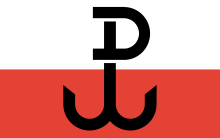“Why in the world did you fight the Germans in the Warsaw Uprising?”
A good friend of mine shook his head. There was more than a question in his demeanor. I sensed a tone of disapproval. “Were you out of your mind?” He was Hungarian and left his native country during the 1956 upheaval. The Hungarians and the Poles were close throughout the history. Certainly, he was familiar with my country’s turbulent past. “Why did you rise? You had nothing to gain and everything to lose.”
The Warsaw Uprising broke out on the 1st of August 1944. Retreating Germans fortified their forces on the left bank of the Vistula River. The Russians stopped their offensive on the right, ostensibly to rest. The Polish Resistance Army, with the support of the government in exile in London, had decided it was the best time to strike. The victory, they thought, would help defeat the Germans, and give Poles a place at the table in negotiating the future of their country. The Russians pushed for the uprising, too, actively encouraging, and promising help. Their Communist, hand-picked, ‘temporary Polish government’ dropped leaflets over Warsaw with appeals to patriotism and calls to raise arms.
The Uprising broke out with mainly young men, women and even children doing most of the fighting. It lasted 63 days. 63 days of heroic sacrifices, broken hopes, carnage and deaths. When it was over, 16,000 of the young fighters died. After the insurgents surrendered, the Germans, with their legendary precision, murdered 200,000 Poles. The killings weren’t the problem. Disposing of dead bodies presented a challenge. The German commanders sent a brigade of ruthless criminals to finish the job. The stench of burning human remains spread over Wola and the neighboring districts of Warsaw. After the invaders emptied the city by murders and forced evacuations, the buildings still left standing after five years of German war and occupation, all the remaining buildings were leveled on a direct order of Himmler. What bombs didn’t do, flamethrowers finished. The country wasn’t crying because there were no tears left.
From the right banks of the Vistula river, the Russians were patiently watching. And taking the names. Polish resistance fighters, who weren’t killed by the Germans, were later methodically tortured and often killed by the Polish Communist puppet governmental security forces. Was the heroic outburst of resistance worth losing the crop of our young, best and brightest?
While visiting Halifax in Nova Scotia, I met an elderly Pole who fought in the Uprising. In his nineties, well-aged, unassuming, soft-spoken, Witold Zahorski still remembered the details well. And as many people who went through hell, he initially didn’t want to elaborate. We spoke about the first skirmish he participated in, the incident which opened the fighting, and which took place just a few steps from my parents’ apartment in Żoliborz.
“Why did you fight? Was it worth it?” I asked after we got to know each other a little better.
He didn’t say much. “I’ve answered this question already,” and directed me to his interview published in ‘Museum of Warsaw Uprising’, in Polish. I found the link.
https://www.1944.pl/archiwum-historii-mowionej.html
It appeared to be a trove of priceless data about this painful time in our history. I found close to 3500 interviews with the survivors of the Warsaw Uprising. From Jerzy Abend to Zdzisław Życieński. I reviewed close to 60 of their stories. Studying them in the entirety was a Herculean task.
Most of them in their nineties, they spoke openly about the agonizing days in their lives. About their short lives, many were in early teens, before their fate threw them in front of German bullets, how they survived, and about the agony of capitulation. They were the lucky ones––16,000 of their friends were killed during 63 days of fighting. And how they were persecuted during the following years by the Polish government security forces.
I found a remarkable consistency in their views on the most important events of their lives.
More about it in my next post.


